Abstract
Forty ponies immunized with inactivated virus vaccine containing A/equine/Miami/63 (H3N8) virus and six unvaccinated, seronegative ponies were experimentally challenged with a representative of recent equine H3N8 virus isolates, A/equine/Newmarket/79. All unvaccinated ponies became infected as judged by virus excretion, febrile responses and antibody responses, but only two of the vaccinated ponies were fully protected. Pre-challenge antibody levels to A/Newmarket/79 virus detected by single radial haemolysis (SRH) correlated well with the degree of clinical protection but the levels required for complete protection (SRH zones greater than 65 mm2) were high. The importance of these results in relation to conventional vaccination procedures against equine influenza is discussed.
Full text
PDF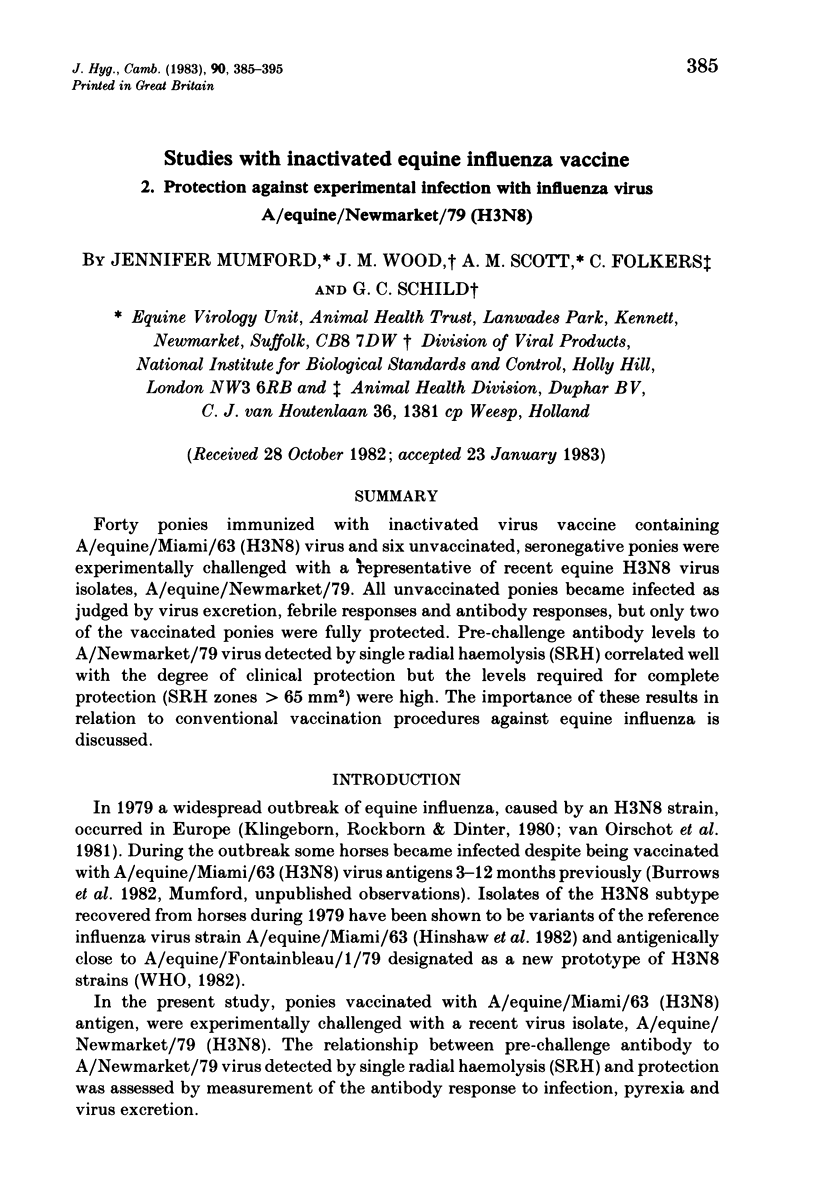
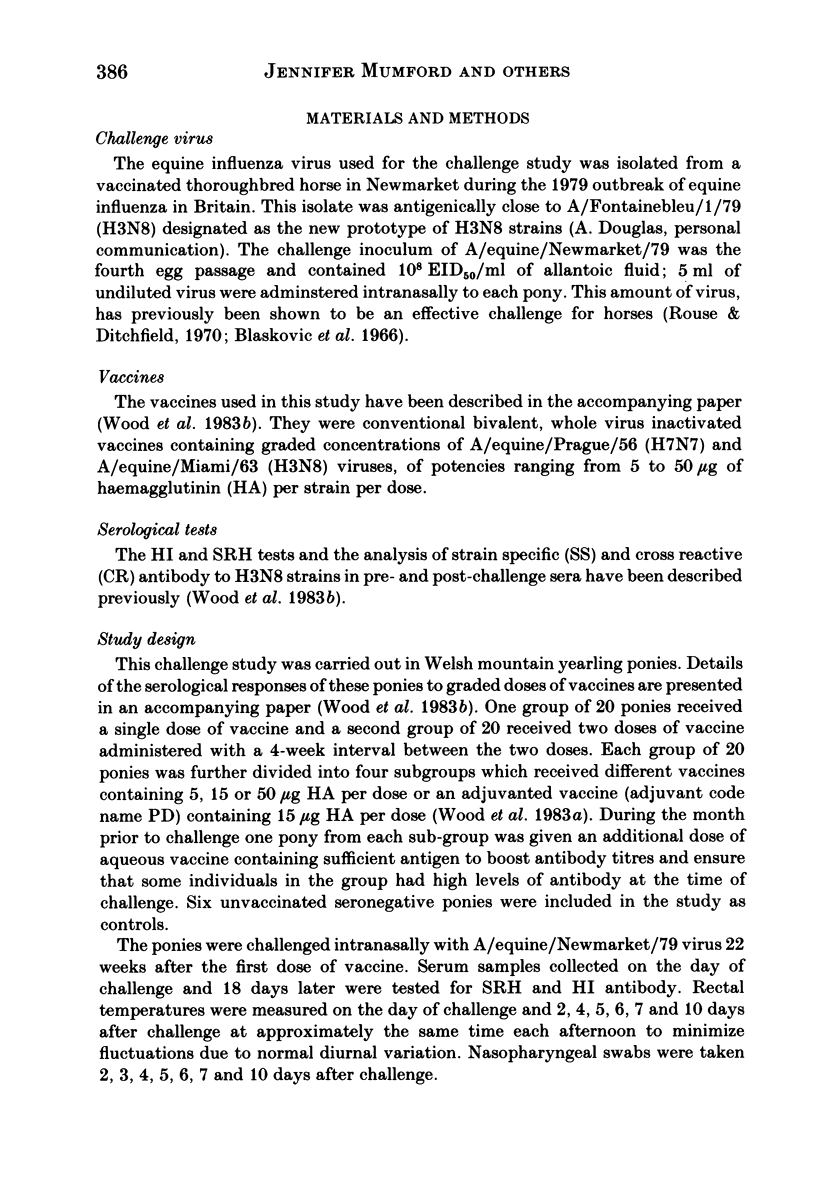
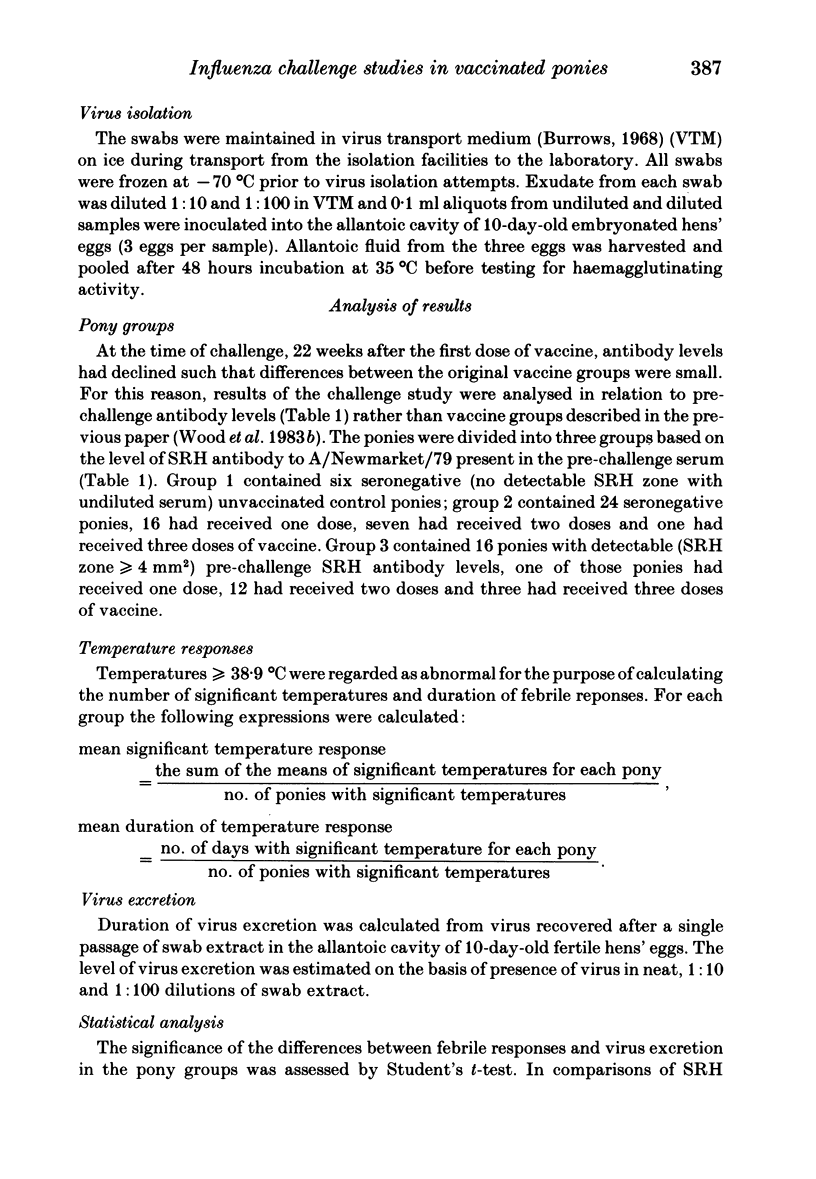
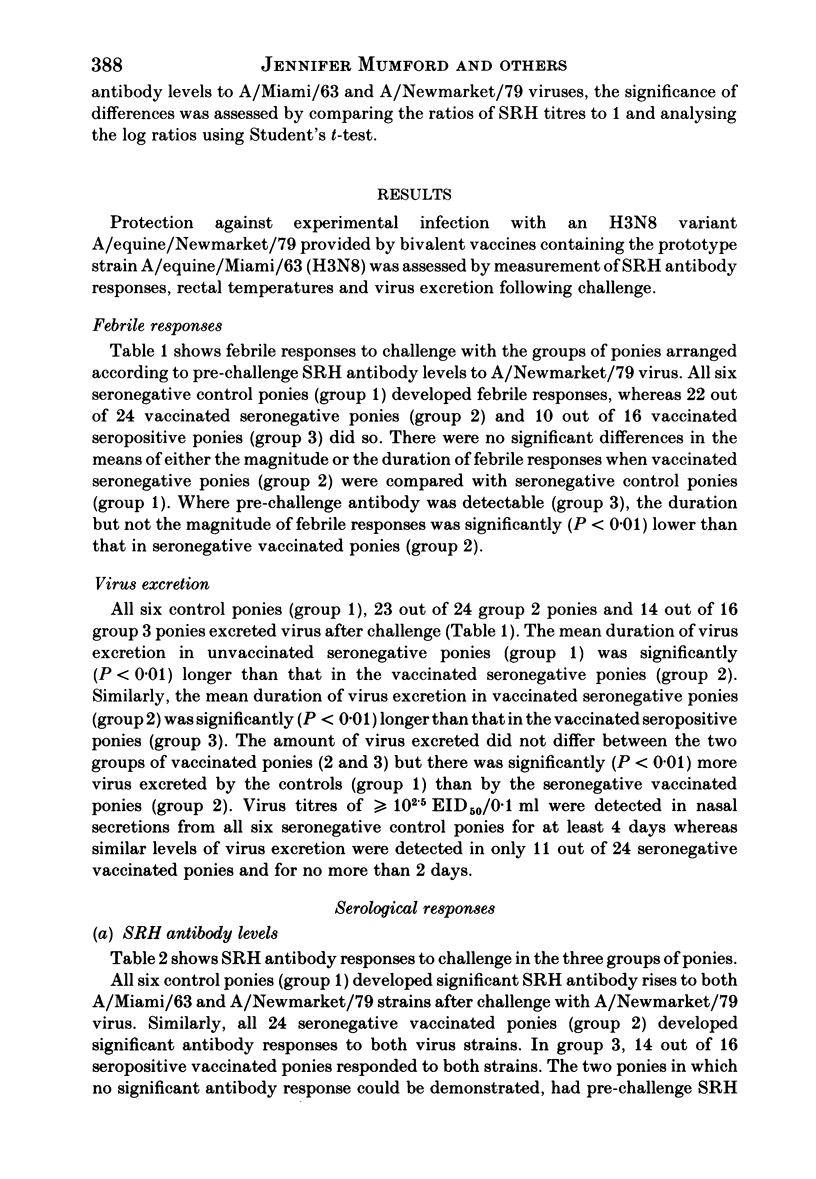
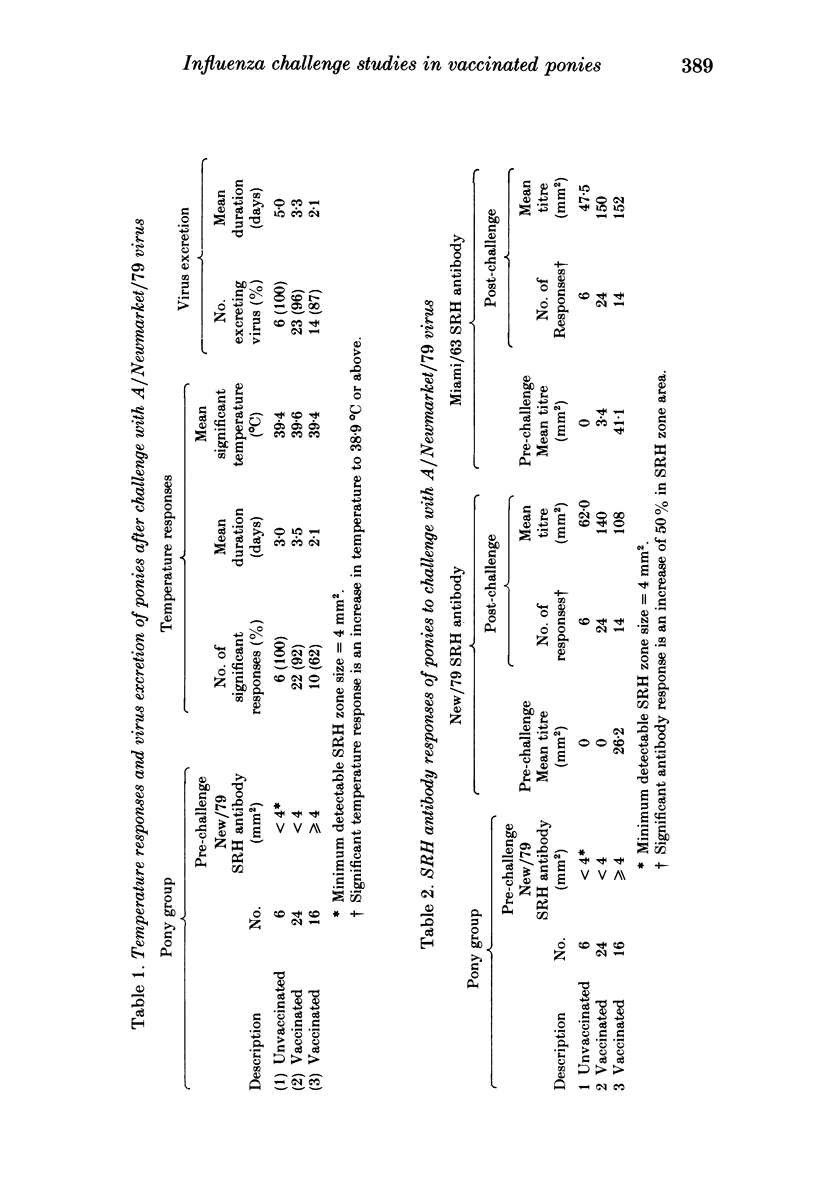
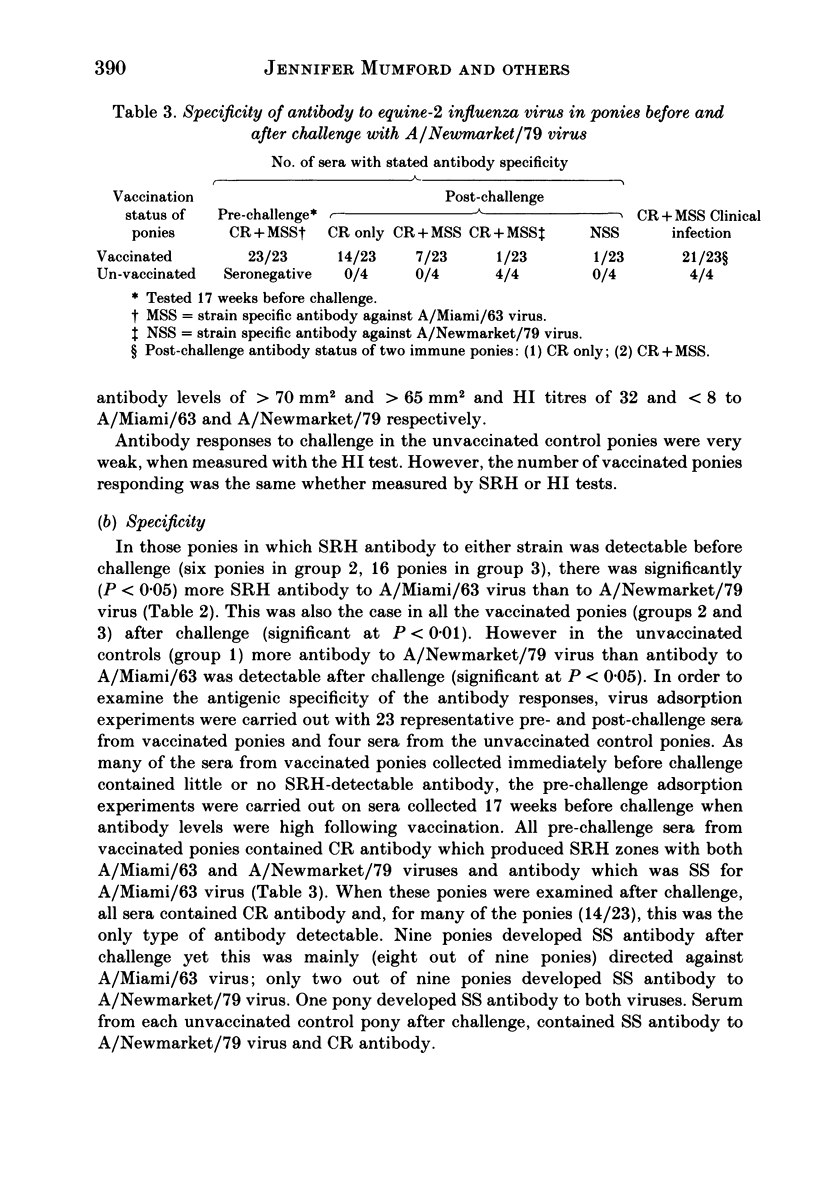
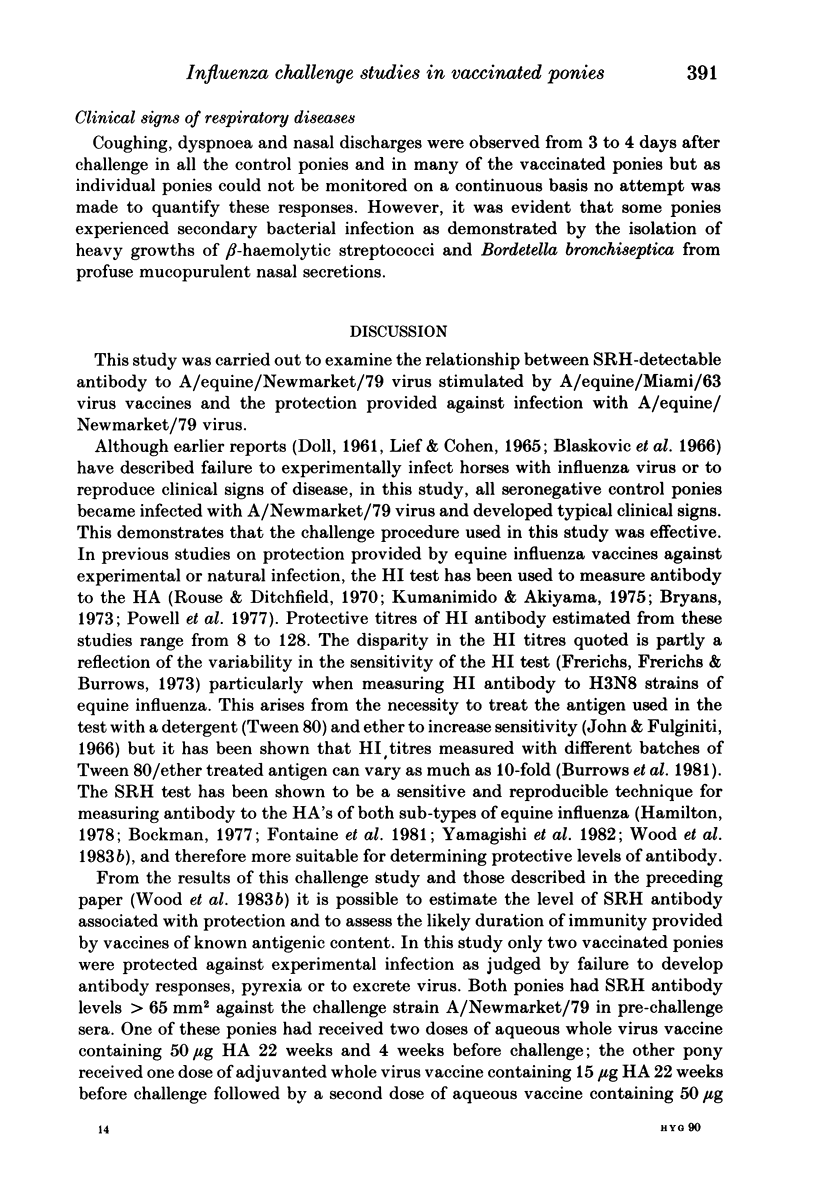
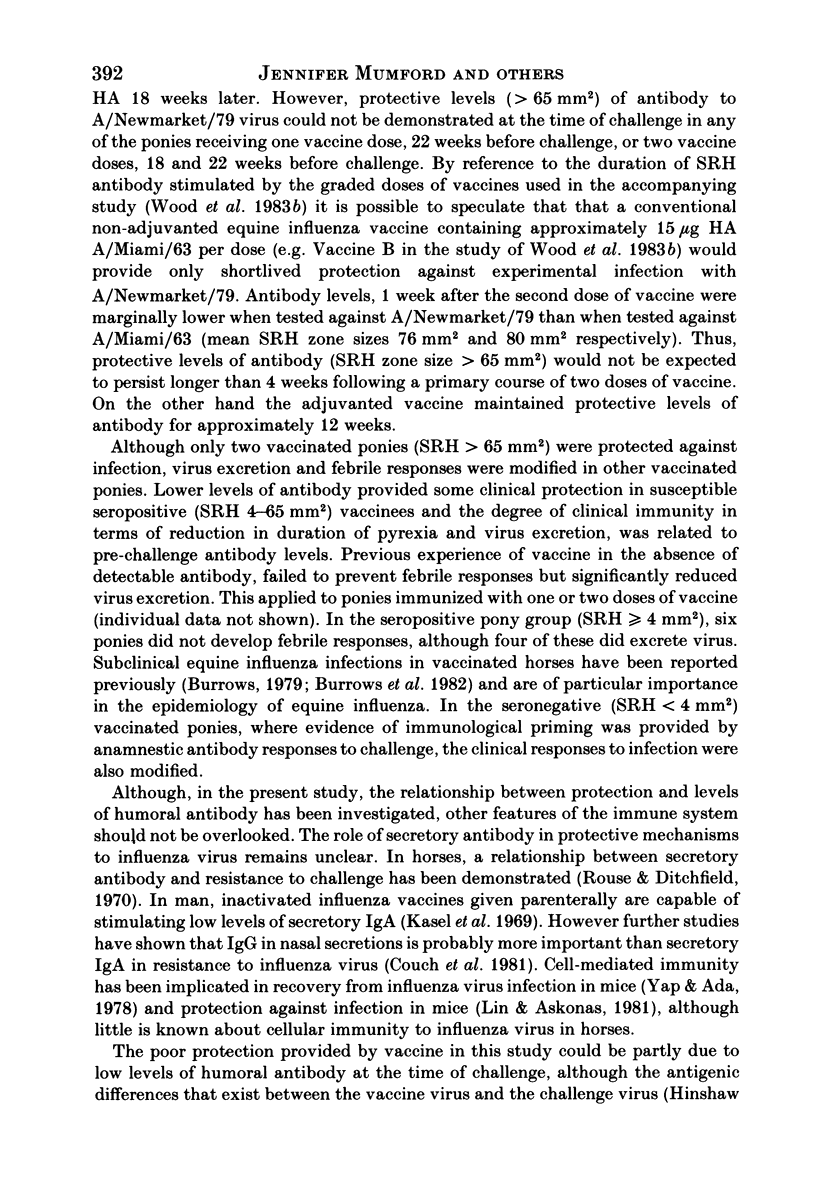
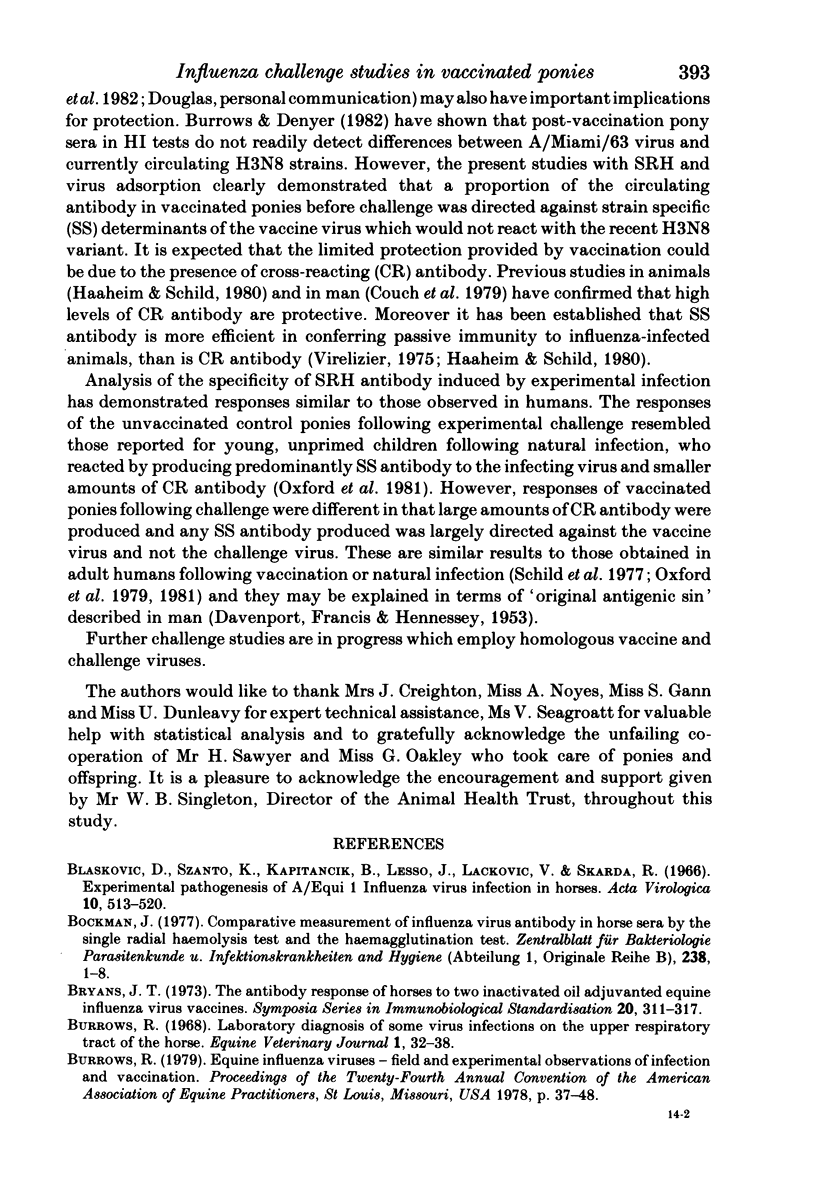
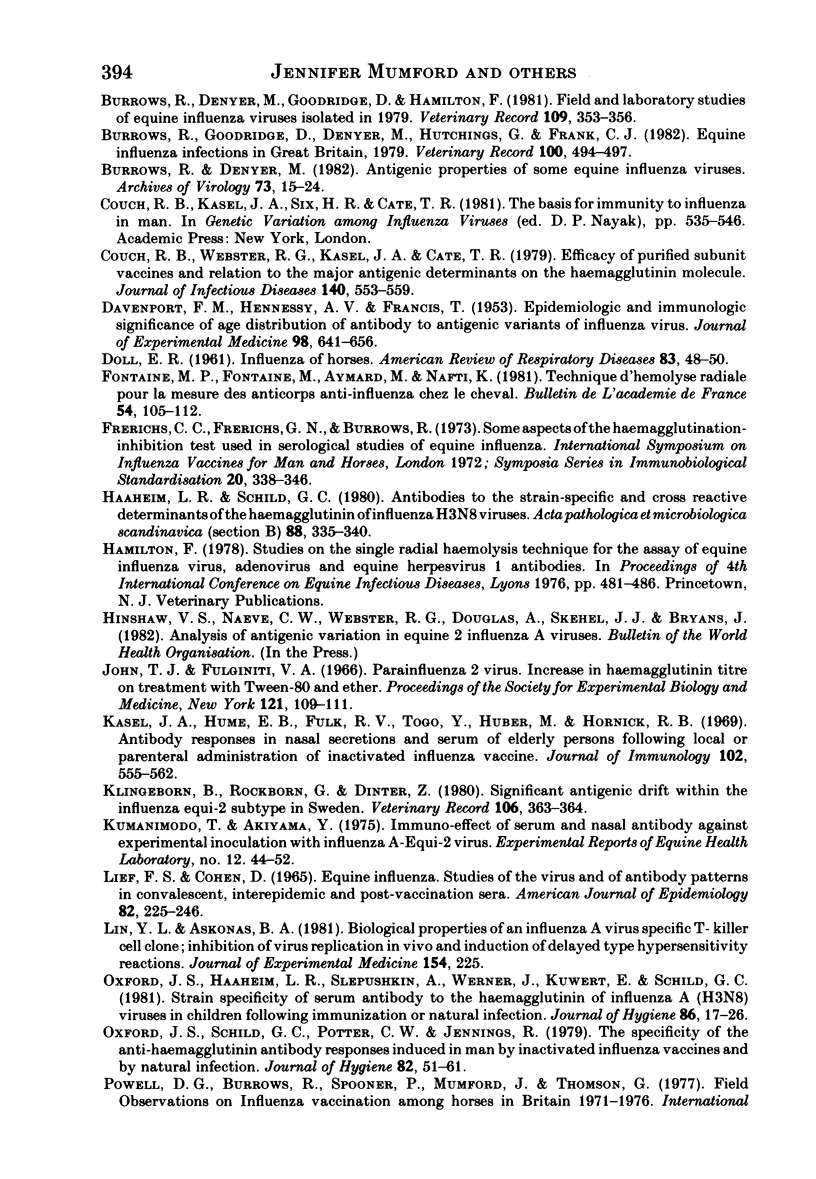
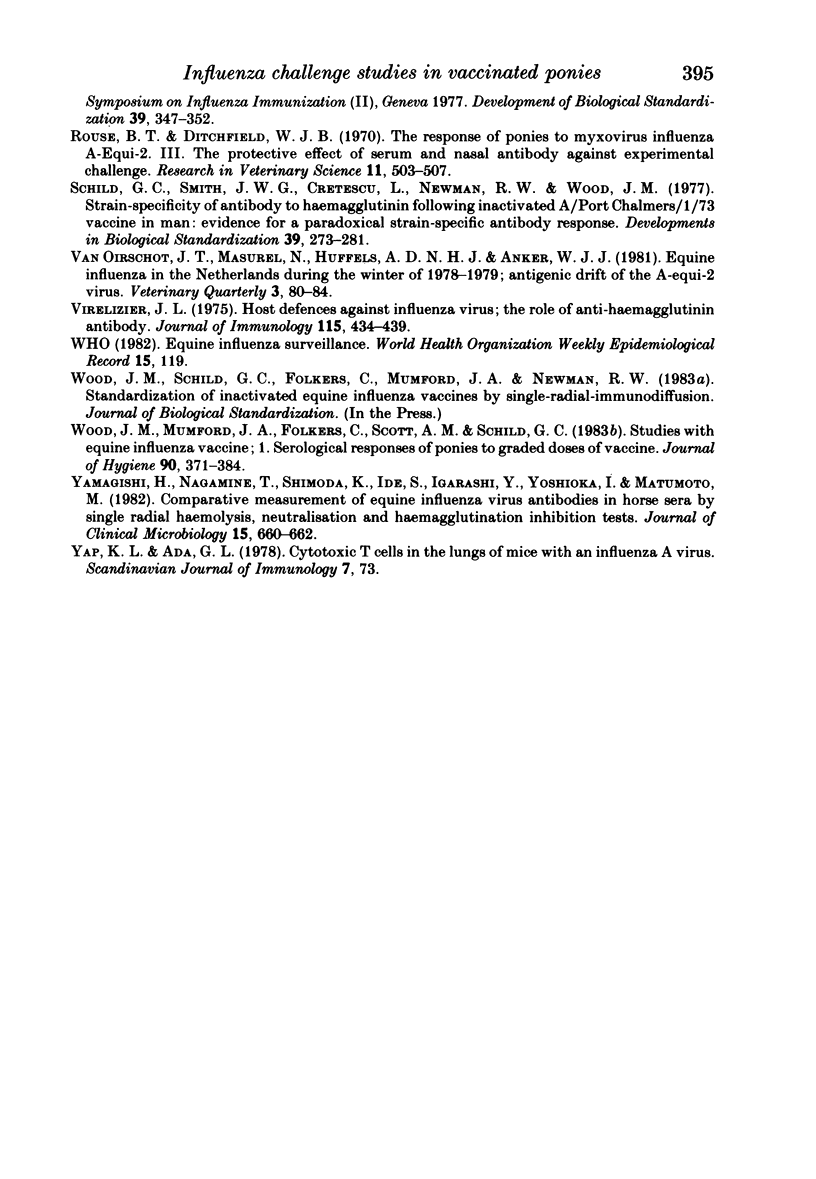
Selected References
These references are in PubMed. This may not be the complete list of references from this article.
- Blaskovic D., Szántó J., Kapitáncik B., Lesso J., Lackovic V., Skarda R. Experimental pathogenesis of A-equi 1 influenza virus infection in horses. Acta Virol. 1966 Nov;10(6):513–520. [PubMed] [Google Scholar]
- Burrows R., Denyer M. Antigenic properties of some equine influenza viruses. Arch Virol. 1982;73(1):15–24. doi: 10.1007/BF01341723. [DOI] [PubMed] [Google Scholar]
- Burrows R., Denyer M., Goodridge D., Hamilton F. Field and laboratory studies of equine influenza viruses isolated in 1979. Vet Rec. 1981 Oct 17;109(16):353–356. doi: 10.1136/vr.109.16.353. [DOI] [PubMed] [Google Scholar]
- Burrows R., Goodridge D., Denyer M., Hutchings G., Frank C. J. Equine influenza infections in Great Britain, 1979. Vet Rec. 1982 May 22;110(21):494–497. doi: 10.1136/vr.110.21.494. [DOI] [PubMed] [Google Scholar]
- Couch R. B., Webster R. G., Kasel J. A., Cate T. R. Efficacy of purified influenza subunit vaccines and relation to the major antigenic determinants on the hemagglutinin molecule. J Infect Dis. 1979 Oct;140(4):553–559. doi: 10.1093/infdis/140.4.553. [DOI] [PubMed] [Google Scholar]
- DAVENPORT F. M., HENNESSY A. V., FRANCIS T., Jr Epidemiologic and immunologic significance of age distribution of antibody to antigenic variants of influenza virus. J Exp Med. 1953 Dec;98(6):641–656. doi: 10.1084/jem.98.6.641. [DOI] [PMC free article] [PubMed] [Google Scholar]
- DOLL E. R. Influenza of horses. Am Rev Respir Dis. 1961 Feb;83(2):48–53. doi: 10.1164/arrd.1961.83.2P2.48. [DOI] [PubMed] [Google Scholar]
- Haaheim L. R., Schild G. C. Antibodies to the strain-specific and cross-reactive determinants of the haemagglutinin of influenza H3N2 viruses. Antiviral activities of the antibodies in biological systems. Acta Pathol Microbiol Scand B. 1980 Dec;88(6):335–340. doi: 10.1111/j.1699-0463.1980.tb02652.x. [DOI] [PubMed] [Google Scholar]
- John T. J., Fulginiti V. A. Parainfluenza 2 virus: increase in hemagglutinin titer on treatment with Tween-80 and ether. Proc Soc Exp Biol Med. 1966 Jan;121(1):109–111. doi: 10.3181/00379727-121-30711. [DOI] [PubMed] [Google Scholar]
- Kasel J. A., Hume E. B., Fulk R. V., Togo Y., Huber M., Hornick R. B. Antibody responses in nasal secretions and serum of elderly persons following local or parenteral administration of inactivated influenza virus vaccine. J Immunol. 1969 Mar;102(3):555–562. [PubMed] [Google Scholar]
- Klingeborn B., Rockborn G., Dinter Z. Significant antigenic drift within the influenza equi 2 subtype in Sweden. Vet Rec. 1980 Apr 19;106(16):363–364. doi: 10.1136/vr.106.16.363. [DOI] [PubMed] [Google Scholar]
- Lief F. S., Cohen D. Equine influenza. Studies of the virus and of antibody patterns in convalescent, interepidemic and postvaccination sera. Am J Epidemiol. 1965 Nov;82(3):225–246. doi: 10.1093/oxfordjournals.aje.a120546. [DOI] [PubMed] [Google Scholar]
- Lin Y. L., Askonas B. A. Biological properties of an influenza A virus-specific killer T cell clone. Inhibition of virus replication in vivo and induction of delayed-type hypersensitivity reactions. J Exp Med. 1981 Aug 1;154(2):225–234. doi: 10.1084/jem.154.2.225. [DOI] [PMC free article] [PubMed] [Google Scholar]
- Oxford J. S., Haaheim L. R., Slepushkin A., Werner J., Kuwert E., Schild G. C. Strain specificity of serum antibody to the haemagglutinin of influenza A (H3N2) viruses in children following immunization or natural infection. J Hyg (Lond) 1981 Feb;86(1):17–26. doi: 10.1017/s0022172400068704. [DOI] [PMC free article] [PubMed] [Google Scholar]
- Oxford J. S., Schild G. C., Potter C. W., Jennings R. The specificity of the anti-haemagglutinin antibody response induced in man by inactivated influenza vaccines and by natural infection. J Hyg (Lond) 1979 Feb;82(1):51–61. doi: 10.1017/s0022172400025468. [DOI] [PMC free article] [PubMed] [Google Scholar]
- Powell D. G., Burrows R., Spooner P., Mumford J., Thomson G. Field observations on influenza vaccination among horses in Britain, 1971-1976. Dev Biol Stand. 1977 Jun 1;39:347–352. [PubMed] [Google Scholar]
- Rouse B. T., Ditchfield W. J. The response of ponies to Myxovirus influenzae A-Equi-2. 3. The protective effect of serum and nasal antibody against experimental challenge. Res Vet Sci. 1970 Nov;11(6):503–507. [PubMed] [Google Scholar]
- Schild G. C., Smith J. W., Cretescu L., Newman R. W., Wood J. M. Strain-specificity of antibody to haemagglutinin following inactivated A/port chalmers/1/73 vaccine in man: evidence for a paradoxical strain-specific antibody response. Dev Biol Stand. 1977 Jun 1;39:273–281. [PubMed] [Google Scholar]
- Virelizier J. L. Host defenses against influenza virus: the role of anti-hemagglutinin antibody. J Immunol. 1975 Aug;115(2):434–439. [PubMed] [Google Scholar]
- Wood J. M., Mumford J., Folkers C., Scott A. M., Schild G. C. Studies with inactivated equine influenza vaccine. 1. Serological responses of ponies to graded doses of vaccine. J Hyg (Lond) 1983 Jun;90(3):371–384. doi: 10.1017/s0022172400029004. [DOI] [PMC free article] [PubMed] [Google Scholar]
- Yamagishi H., Nagamine T., Shimoda K., Ide S., Igarashi Y., Yoshioka I., Matumoto M. Comparative measurement of equine influenza virus antibodies in horse sera by single radial hemolysis, neutralization, and hemagglutination inhibition tests. J Clin Microbiol. 1982 Apr;15(4):660–662. doi: 10.1128/jcm.15.4.660-662.1982. [DOI] [PMC free article] [PubMed] [Google Scholar]
- Yap K. L., Ada G. L. Cytotoxic T cells in the lungs of mice infected with an influenza A virus. Scand J Immunol. 1978;7(1):73–80. doi: 10.1111/j.1365-3083.1978.tb00428.x. [DOI] [PubMed] [Google Scholar]
- van Oirschot J. T., Masurel N., Huffels A. D., Anker W. J. Equine influenza in the Netherlands during the winter of 1978-1979; antigenic drift of the A-equi 2 virus. Vet Q. 1981 Apr;3(2):80–84. doi: 10.1080/01652176.1981.9693801. [DOI] [PubMed] [Google Scholar]


